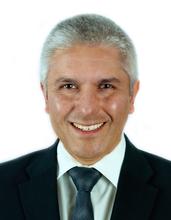 Dr. Yuri Quintana (PhD ’95) is the Director of Global Health Informatics in the Division of Clinical Informatics, Beth Israel Deaconess Medical Center, and Assistant Professor of Medicine at Harvard Medical School. Dr. Quintana’s research is focused on developing innovative technologies and systems that empower communities of healthcare professionals, patients and families to collaborate on a worldwide basis.
Dr. Yuri Quintana (PhD ’95) is the Director of Global Health Informatics in the Division of Clinical Informatics, Beth Israel Deaconess Medical Center, and Assistant Professor of Medicine at Harvard Medical School. Dr. Quintana’s research is focused on developing innovative technologies and systems that empower communities of healthcare professionals, patients and families to collaborate on a worldwide basis.
Dr. Quintana was past principal investigator in the Canadian HealNet Research Network, focusing on consumer health informatics, and a faculty member at the University of Western Ontario.
We caught up with Dr. Quintana to ask him some questions about his work and life after Waterloo.
-----------------------------------------------------------------------------------
You have developed several online medical collaboration networks and applications for mobile health. Can you tell us more about this?
I started in the early 2000s to build specialized search engines, online medical education, and interactive decision tools for Canadian healthcare institutions. I moved to the United States in 2002, and I have built several global networks that incorporate both web and mobile technologies in the areas of cancer, pediatrics, elder care and maternal health. Increasingly my work is focused on how mobile technologies facilitate collaboration between patients, families and healthcare providers.
One of the programs you have created is Cure4Kids which is a pediatric cancer education collaboration website which is used by thousands of medical professionals worldwide. Can you tell us how this has changed the way healthcare providers interact with each other?
Cure4Kids is an online global network for supporting healthcare professionals in pediatric oncology developed at St. Jude Children's Research Hospital. The website has over 40,000 users in more than 160 countries and provides online education and collaboration tools to allow doctors to develop, learn and deploy treatment strategies tailored to the needs of local hospitals. Treatment strategies need to be adapted to the level of local resources and availability of medications. Over 200 groups have formed worldwide on Cure4Kids, and some centers have made very significant improvements in their survival rates.
While the developing countries were the first to use Cure4Kids, the developed countries are also now using it for collaborations. My more recent work is developing new global collaborative platforms such as OPENPediatric for Boston Children’s Hospital, and MADCaP for Dana Farber Cancer Institute for prostate cancer research. I am also part of a team at Harvard developing InfoSAGE for connecting elders with their families and healthcare providers, and a global platform for maternal health to connect mothers, midwives, and healthcare providers. The future of healthcare will depend on connected online and mobile health systems to support care not just at hospitals but also at home with families involved in the care of loved ones.
You have your degrees in Engineering from the University of Waterloo. Was it always your intent to use your education for medical technologies?
My initial work was on intelligent search engines. I later realized that search system alone was not enough to support the information needs of practitioners and families. Users need a way to not only get specific answers but also be able to engage with colleagues or other patients for education and collaborative discussions on how to implement changes. The new systems I develop are known as social learning platforms that combine learning, communication and collaboration. These systems draw much from the fields of engineering, education, and cognition. I have a better appreciation now for multi-disciplinary design and teamwork.
What was the most memorable or impactful part of your UWaterloo experience?
The co-op experience was one of the most impactful experiences that exposed me to real life challenges and work environments. However, I think the entrepreneurial spirit of Waterloo was probably the most impactful. At Waterloo there are always people around who dream big, do big things, and are not intimidated to take on challenges. At a young age, I worked for the early Waterloo computer spin-off companies, and the entrepreneurial spirit that I experienced at Waterloo was electric and mesmerizing. I know that whatever I do, and wherever I go, I carry that Waterloo entrepreneurial spirit with me.
What advice do you have for young alumni looking to enter the medical technology field?
I think people need to think about being multi-disciplinary in their studies and career. Most real life problems are very complex and to be successful, you need to have a solution that is multi-disciplinary. Technology and medical sciences alone will not solve our healthcare problems. Healthcare is complex with lots of stakeholders, and it requires system thinking. Behavior change and adoption of new systems require strategies for change management. Knowing how to work with people of diverse disciplines is essential to develop solutions that scale and can be adapted to new circumstances. It is incredibly rewarding to see systems you developed having a powerful positive impact on patients and families.
What does it mean to you to be a part of an institution celebrating 60 years of innovation? What do you see for the next 60 years at the University of Waterloo?
Waterloo has achieved tremendous things in the short 60 years of its existence. The entrepreneurial spirit will hopefully be continued and be ever more recognized worldwide. I will always make the argument that Waterloo is one of the most entrepreneurial and innovative universities in the world. It is great to see so many alumni give back to Waterloo by mentoring students, hiring co-ops, donating, and getting the word out. I am proud to call Waterloo my alma mater and to have gotten my professional start at Waterloo.





